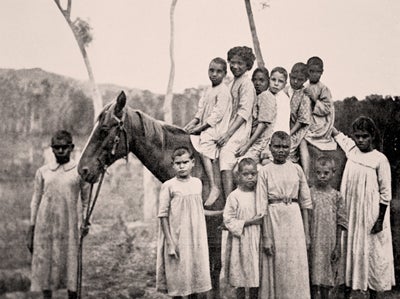The contributors to this publication come from every part of Australia. They are sons and daughters, mothers and grandmothers, fathers and grandfathers. They are orphans, scholars, single parents, teachers, prisoners, healers, jillaroos and football stars. Many continue to suffer the effects of removal, manifesting in drug abuse, incarceration and mental illness. Thank you for sharing your stories with us, and shedding more light on what was up until recently, a taboo topic in Australia's history. Each of you took a great risk. You looked into the corners of your hearts that hold your most painful memories and generously shared them with a national audience. For many of you, it was the first time you were writing about your experience, or publicly displaying your artwork.
Story telling continues to be crucial to the resilience of Aboriginal peoples - stories pass on our history, our identity. Storytelling is an indispensable part of both the recognition of suffering and the journey of healing.
To commemorate the 10th anniversary of the publication of the Bringing them home report, it is fitting that we should look to those whose stories of removal formed the basis of the report and its recommendations. With this in mind, the Human Rights and Equal Opportunity Commission invited Indigenous peoples across Australia to tell us their experiences of removal, their thoughts ten years on from the Inquiry and their hopes for the future. The poetry, stories and artwork featured in Us Taken-Away Kids are the fruits of this invitation.
The publication begins with a chronological overview of the legislation and events which have shaped the lives of Australian Aborigines since colonisation. This is followed by three themed sections. 'Mother' and 'Journeys and Homecoming' deal with the experiences in the life journey of a stolen child. 'Reconciliation' includes non- Indigenous as well as Indigenous peoples' thoughts on moving forward, to a more inclusive vision for black and white Australia- the voices of the longest surviving continuous culture in the world, united with those of their fellow Australians.
For Aboriginal people, the years since the Bringing them home report have been filled with great hope as well as lost opportunities. While there have been positive developments and initiatives, many opportunities for governments to work with our communities and advance the goal of national reconciliation have been lost.
However, amidst these disappointments, there are still reasons to hope. The 2006 Tasmanian Stolen Generations compensation package is a great step forward in the resolution of the generations of suffering inflicted on Tasmanian Aboriginal people. But the vast majority of the Stolen Generations are still waiting for this validation.
Positive steps have also been made in the recognition of native title. The successful Noongar native title claim earlier this year that covers much of Perth and the surrounding area demonstrates that two systems of land title can and should legitimately co-exist.
More recently, the decision by the Supreme Court of South Australia to award damages to Bruce Trevorrow in recognition of the harm he suffered through illegal removal from his family is another step in the right direction. However, Mr Trevorrow's victory, like that of the Noongar claimants, only came after years of litigation because the respective state governments and others opposed their claims. I am mindful at the time of publication that both decisions may still be appealed.
These victories for social justice are a strong reminder that all Australians – black and white - must continue to strive for a process of true and lasting reconciliation. The goal of mutual respect and cultural understanding will not be borne out of adversarial processes that pit citizens against their governments. Rather, as a nation, we need to acknowledge the human rights violations that have occurred and accept that everyone affected by forcible removals is entitled to reparation and compensation.
Ten years on, the recommendations of the Bringing them home report still stand as the starting point for a national reconciliation process. I call on all Australian governments to implement those recommendations in full, with all possible urgency, so that all Australians can reach their full potential.
Us Taken- Away Kids is a testament to the resilience of Aboriginal people, our ability to overcome adversity, to look to a brighter future, and to triumph in the face of desolation and despair.
The storytellers within are more than the faces of Indigenous Australia. These people are the voices of our living history. Their stories are laden with tragedy, loneliness and loss. But never far away is their inexplicable optimism. A hope for the future, for our children, for the Australian nation.

Tom Calma
Aboriginal and Torres Strait Islander Social Justice Commissioner
Photograph: Aboriginies at Momamona Mission, 1914. Courtesy State Library of Queensland and Community at Momomona.
Click on image for larger picture.

